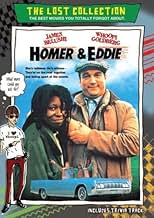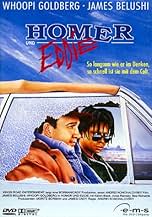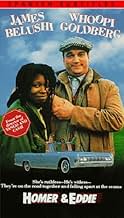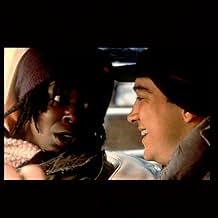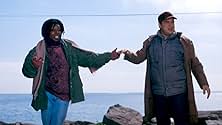IMDb रेटिंग
5.3/10
2.1 हज़ार
आपकी रेटिंग
अपनी भाषा में प्लॉट जोड़ेंA mentally disabled man gets help from a sociopath when he tries to reunite with his dying father, who years earlier disowned him.A mentally disabled man gets help from a sociopath when he tries to reunite with his dying father, who years earlier disowned him.A mentally disabled man gets help from a sociopath when he tries to reunite with his dying father, who years earlier disowned him.
- पुरस्कार
- 1 जीत और कुल 1 नामांकन
Jim Belushi
- Homer Lanza
- (as James Belushi)
Jeff Thiel
- Twin #2
- (as Jeffrey Thiel)
फ़ीचर्ड समीक्षाएं
OK, first thing: this movie is NOT a comedy, not by a long shot. It has funny parts, but it is not a comedy.
This is the best piece of acting you'll ever see from James Belushi and also one of Whoopi Goldberg's finest, unarguably.
The movie is touching, funny, sad, violent and breathtaking. So for anyone who hasn't seen it, see it!
This is the best piece of acting you'll ever see from James Belushi and also one of Whoopi Goldberg's finest, unarguably.
The movie is touching, funny, sad, violent and breathtaking. So for anyone who hasn't seen it, see it!
Though it has been years since I have seen this movie, I remember it with affection and feel compelled to counter the sweeping dismissals of many reviews.
In the bone-hard truth of the desert, humanity is stripped down to persistence, interdependence, and hope and faith in the absence of a visible destination. The road is a trajectory for self-recognition, catharsis, and redemption. And so, just as the desert surprises us with life in the most unexpected places, Homer and Eddie surprise themselves.
Homer and Eddie are not that unlikely a couple. Neither has anywhere to go, figuratively or literally; so they keep on going. Neither has a future to look forward to, and yet each of them harbors hope. They do so because they are still alive, and moving and hoping are as basic to life as breathing. They did not choose each other's company, and they are no less prejudiced towards others for their own low station in society.
Though a road movie, `Homer and Eddie' it is not of the usual sort. Violence here is not redeemed by a `good cause' or an undercurrent of sex appeal; vile speech is not tempered by youth or good looks; and there is no romantic involvement to offer distraction. Homer and Eddie are not Thelma and Louise. They have more in common with Lennie and George in `Of Mice and Men', or with Josué and Dora in `Central Station'. Sidelined by society for crime, poverty, terminal disease and mental disability, Homer and Eddie begin their companionship by default. Eddie reluctantly looks after Homer, like a parent after a stranger's child. As she takes on responsibility for someone more helpless than herself, Eddie senses a reawakening of her capacity to care (in every sense) for another human being and, implicitly, for herself. By defending Homer's human dignity, she recovers her own. Though it will not avert her fate, the experience restores Eddie's humanity.
I found the film empowering because it takes its protagonists and their situation seriously. Homer and Eddie are not innocent. Nor are their shortcomings dismissible as picturesque, colorful, or cute. They don't try to be lovable; they simply are who they are. Their humor is that of people who believe they have nothing to lose. The film's perspective is level and from the inside out, not from the lofty perch of mainstream society. In that sense, it isn't judgmental, either, and so allows us to empathize with its outcasts. Their heroism is in their refusal to be victims, and in rising above their situation against all odds. This quiet and remarkably subtle piece is some of the best I have seen of Hollywood, and the tears I cried were those of joy and relief: No matter how low you sink in life, it is never too late to be a worthy human being.
In the bone-hard truth of the desert, humanity is stripped down to persistence, interdependence, and hope and faith in the absence of a visible destination. The road is a trajectory for self-recognition, catharsis, and redemption. And so, just as the desert surprises us with life in the most unexpected places, Homer and Eddie surprise themselves.
Homer and Eddie are not that unlikely a couple. Neither has anywhere to go, figuratively or literally; so they keep on going. Neither has a future to look forward to, and yet each of them harbors hope. They do so because they are still alive, and moving and hoping are as basic to life as breathing. They did not choose each other's company, and they are no less prejudiced towards others for their own low station in society.
Though a road movie, `Homer and Eddie' it is not of the usual sort. Violence here is not redeemed by a `good cause' or an undercurrent of sex appeal; vile speech is not tempered by youth or good looks; and there is no romantic involvement to offer distraction. Homer and Eddie are not Thelma and Louise. They have more in common with Lennie and George in `Of Mice and Men', or with Josué and Dora in `Central Station'. Sidelined by society for crime, poverty, terminal disease and mental disability, Homer and Eddie begin their companionship by default. Eddie reluctantly looks after Homer, like a parent after a stranger's child. As she takes on responsibility for someone more helpless than herself, Eddie senses a reawakening of her capacity to care (in every sense) for another human being and, implicitly, for herself. By defending Homer's human dignity, she recovers her own. Though it will not avert her fate, the experience restores Eddie's humanity.
I found the film empowering because it takes its protagonists and their situation seriously. Homer and Eddie are not innocent. Nor are their shortcomings dismissible as picturesque, colorful, or cute. They don't try to be lovable; they simply are who they are. Their humor is that of people who believe they have nothing to lose. The film's perspective is level and from the inside out, not from the lofty perch of mainstream society. In that sense, it isn't judgmental, either, and so allows us to empathize with its outcasts. Their heroism is in their refusal to be victims, and in rising above their situation against all odds. This quiet and remarkably subtle piece is some of the best I have seen of Hollywood, and the tears I cried were those of joy and relief: No matter how low you sink in life, it is never too late to be a worthy human being.
This is easily the "craziest" Road Movie ever made - and one of the best. It's funny, tragic, dramatic and intelligent. Konchalovsky's composition is without any flaws - you'll find no plot holes or boring sequences destroying the flow of the story. The soundtrack supports the atmosphere of the movie perfectly. James Belushi stars as Homer, a retarded man, who goes on a long journey to see his dying father. Right at the start he's being robbed of all his cash and has to sleep in a car cemetery. There he meets the criminal Eddie, played by Whoopi Goldberg, who's slowly dying of a brain tumor. This tumor is the reason for several violent outbreaks. Eddie escorts Homer and arranges the first sexual contact for him - with a monstrous prostitute. This results in one of the most charming and funny "sex scenes" I've ever seen, beaten only by the priceless dancing scenes with Homer and Eddie at the pier. I've never seen one of the two acting better. But don't miss the guest appearances of Anne Ramsey, Karen Black and Jesus! And be warned: even though this film is full of funny, charming and lovable scenes it has also its violent parts.
If you liked "Harold & Maude" and "Gilbert Grape" this is a film for you!
If you liked "Harold & Maude" and "Gilbert Grape" this is a film for you!
Let's start with the ugly just to get it out of the way. I think this movie would have been considered a cult classic on par with Harold and Maude if someone besides Belushi had played Homer. At times he seemed to fall out of character at others it just looked like he was an actor playing a retarded person and very rarely he seemed in character. It wasn't a role that could be pulled off by over-acting or playing bigger than life. This was a great role played by the wrong actor. Now the bad, the continuity and sound track distracted from the story, How would people recognize Homer if he had been gone since childhood and his parents had denied him? The times you were expected to suspend belief to forward the story or develop characters were too glaring and the music was out of sync with the moods.
But yet I gave it a 5 out of 10 because of the good. Whoopi who is not my favorite actress did everything with her character that Belushi could not do with his, and the story as a whole and what it was trying to convey about the cast-aways of society kept me watching to see the inevitable ending.
But yet I gave it a 5 out of 10 because of the good. Whoopi who is not my favorite actress did everything with her character that Belushi could not do with his, and the story as a whole and what it was trying to convey about the cast-aways of society kept me watching to see the inevitable ending.
This is not a film with a script that Konchalovsky wrote--it is by an unknown Patrick Cirillo. (For the uninitiated, Konchalovsky's scripts include the early works of Tarkovsky, his classmate in film school.) There are a few distinct Konchalovsky sequences--the appearance of Jesus-like characters carrying a wooden cross on the empty streets of California viewed twice by the Whoopi Goldberg character of Eddie. This is the best performance of Ms Goldberg that I have seen to date. Two, the original music is by Eduard Artemyev, the composer of Tarkovsky's classic films "Solaris" and "Stalker" and a host of Konchalovsky's own works. The Hungarian maestro Lojas Koltai is the cinematographer--famous for his contribution to the works of the Italian director Tornatore and the Hungarian Istvan Szabo. For cineastes, there is a cameo by Karen Black as a madam of a US brothel. More importantly, the film is a sad tale of how the rich and poor alike in the US, disown their own family members with disabilities. That is a touch of the real Konchalovsky.
क्या आपको पता है
- ट्रिवियाBest buddies in this movie, Whoopi Goldberg and Jim Belushi previously appeared as rivals in जम्पिन जैक फ़्लैश (1986).
- गूफ़When Eddie spots the red car at the produce stand and tells Homer to pull in there, she is in the back seat. After they pull in they show her sitting in the front seat.
- भाव
Eddie Cervi: Feelin' pretty good? Then let's go!
- साउंडट्रैकDown Home Jubilee
Performed by Susi Beatty
Written by Dennis Morgan, Spady Brannan & Susi Beatty
Produced by David Malloy
Courtesy of Little Shop of Morgansongs/Spady Music/S.G.P. LTD
टॉप पसंद
रेटिंग देने के लिए साइन-इन करें और वैयक्तिकृत सुझावों के लिए वॉचलिस्ट करें
- How long is Homer and Eddie?Alexa द्वारा संचालित
विवरण
- चलने की अवधि1 घंटा 40 मिनट
- रंग
- ध्वनि मिश्रण
- पक्ष अनुपात
- 1.85 : 1
इस पेज में योगदान दें
किसी बदलाव का सुझाव दें या अनुपलब्ध कॉन्टेंट जोड़ें




